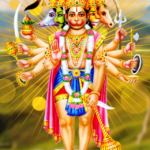Dev Patel’s directorial and screenwriting debut, “Monkey Man,” is more than just an action thriller; it’s a narrative woven with intricate layers of faith, vengeance, and societal commentary. Patel’s initial pitch described it as “a revenge film about faith,” indicating his desire to explore deeper themes beyond mere action sequences.
Drawing Inspiration from Mythology and Modern Realities
The genesis of “Monkey Man” can be traced back to Hindu mythology, specifically the legend of Hanuman, a deity celebrated for his strength and courage. Patel saw parallels between these ancient stories and modern superhero iconography, such as Superman, which inspired him to blend myth with contemporary narrative.
The film’s protagonist, Kid, portrayed by Patel himself, navigates an underground fight club while nursing a desire for vengeance following his mother’s tragic death. This quest for retribution leads him to infiltrate the elite echelons of a Mumbai-like city, drawing upon the mythology of Hanuman to infuse his character with resilience and determination.
Political Undertones and Universal Relevance
While “Monkey Man” is set against the backdrop of a fictionalized Mumbai, its thematic resonance extends far beyond geographical boundaries. Patel deliberately infuses the narrative with political commentary, particularly critiquing elements of Hindu nationalism and societal inequalities prevalent in modern India.
The film serves as a poignant reflection on issues like violence against women, the caste system, and police brutality, echoing struggles faced by marginalized communities worldwide. By intertwining these themes with the action-packed storyline, Patel crafts a cinematic experience that not only entertains but also provokes introspection and dialogue.
Challenges and Triumphs in Filmmaking
Behind the scenes, “Monkey Man” faced a myriad of challenges, from the logistical complexities of production to unforeseen setbacks like the coronavirus pandemic. Patel himself endured physical injuries, including a broken hand and foot, underscoring the arduous journey of bringing his vision to life.
Despite these obstacles, Patel’s resilience and dedication shone through, buoyed by the support of his cast and crew. Sharlto Copley, who portrays Tiger in the film, attests to Patel’s unwavering commitment, describing the directorial process as an “unusual hell” that ultimately yielded extraordinary results.
From Rejection to Redemption
After an initial setback with Netflix, “Monkey Man” found a new home under the patronage of Jordan Peele and Universal Pictures. Peele’s recognition of Patel’s filmmaking prowess and the film’s compelling narrative led to its eventual acquisition, breathing new life into a project that seemed destined for obscurity.
A Personal Journey of Acceptance
For Patel, the journey of “Monkey Man” represents more than just a professional milestone; it’s a deeply personal odyssey of self-discovery and acceptance. The film’s completion marked a leap of faith for Patel, embodying the imperfections and vulnerabilities inherent in creative expression.
As he reflects on his father’s wisdom and the words of Rabindranath Tagore, Patel embraces the notion of releasing his creation into the world, flaws and all. “Monkey Man” symbolizes not only Patel’s artistic vision but also his willingness to confront adversity and share his truth with audiences worldwide.







